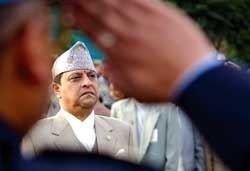 Competence and cleanliness aren't attributes that determine the fate of a government. It is its legitimacy. Lack of legitimacy is the main reason premier Sher Bahadur Deuba took a month to cobble together a functional council of ministers.
Competence and cleanliness aren't attributes that determine the fate of a government. It is its legitimacy. Lack of legitimacy is the main reason premier Sher Bahadur Deuba took a month to cobble together a functional council of ministers. From the day cave-dwelling humans waved their clubs to show clan members who was boss, the legitimacy of power has remained the central question of politics. It took centuries for chieftaincy to evolve into hereditary monarchy, but once the process was complete, it became nearly impossible to shake it.
People power began as far back as 1215 with the signing of the Magna Carta in England. The American Revolution established the principle of the 'rights of man', from then on political legitimacy could only be derived from the consent of the governed. Then the French Revolution in 1789 shook the venerated 'theory of divine rights'.
When the old order of inherited pelf and privileges was challenged by a new class of democratic entrepreneurs, the ensuing chaos gave rise to new Caesars promising to deliver peace and prosperity at the price of liberty. It was conflict between inherited class and caste on the one hand and consent and contract on the other that gave rise to political usurpers like Lenin, Stalin, Mussolini, and Hitler ruled in the name of the people, but without their permission or participation. Mao and Mahendra were rulers of the same tradition, even though the latter held legitimate claims to the sanction of the Hindu religion.
Legitimism by mandate is a product of a post-colonial world order where imperial powers chose their favourites and foisted them upon newly emerging states. This trend continued with the Cold War American mindset "he may be a sonofabitch but he is our sonofabitch" giving rise to a clutch of tin-pot dictators in banana republics around the world.
Post 9/11, we have seen a resurgence of this doctrine but now communism has been replaced by radical Islam as the evil empire. Washington neocons are once more looking for the certainty that only dictatorial strongmen can ensure amidst the political volatility of the abjectly poor.
For regime sponsors looking for peace and stability rather than democracy and justice the selection of Deuba to head a government formed to fight insurgency is politically sexy. He is sufficiently right-of-the-centre to ensure unflinching support to free-market fundamentalism, and yet flexible enough to lure supporters from the left (UML) and the right (RPP) to implement the agenda of the global right.
But it is difficult to run a country with the support of the foreigners, army and the palace combine alone. What really counts is the consent of the governed. When the Rana rulers in 1950 crowned Prince Gyanendra king, Britain and America quickly supported the move. But within three months, the Ranas has been overthrown by the people. Of course, the new emperors of a newly-independent India played a role, but that is a constant which can't be wished away in this kingdom.
That brings us to Girija Prasad Koirala's sudden trip to rainless and sizzling Delhi. Koirala may or may not hold discussions with the Maoist leadership while there, but his mere presence in India is pregnant with political possibilities.
Debates over the common minimum programme between the aspirants to the cabinet of royal nominees have no meaning, as premier Deuba has no control over the agenda of his government. The controversy over the Work Performance Regulation is equally pointless: if the king believes in his premier, it is not necessary. If he doesn't, its amendment wouldn't change anything. These are sideshows, and the main drama to decide the fate of democracy in Nepal may be unfolding once again in New Delhi.
Premier Deuba may be juggling with the 51, 41, or 31-point demands of the RPP or UML. But, because he holds office at the pleasure of the king, he has only one agenda: keep his sponsors happy.



